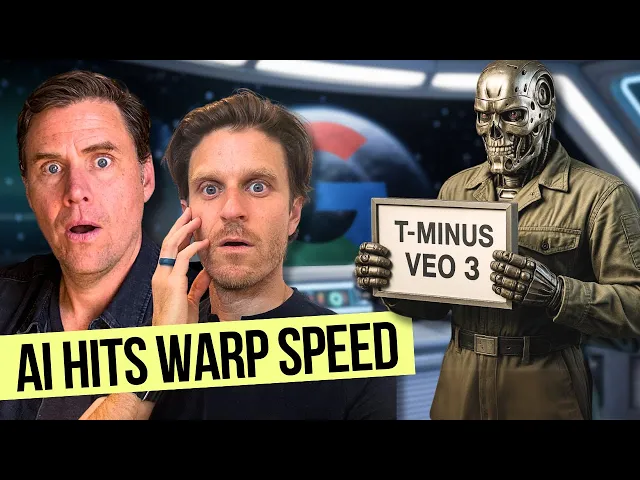Google Went AI Crazy and VEO 3 Is Just the Start

Google's AI blitz redefines search forever
In a stunning shift that feels both inevitable and revolutionary, Google has unleashed a wave of AI integrations that fundamentally transform how we interact with the world's dominant search engine. The search giant's latest moves, particularly with its VEO 3 technology, signal that we've crossed a threshold where AI isn't just an add-on feature but the new core of Google's identity.
Key Points
- Google has aggressively integrated AI across its ecosystem, with VEO 3 representing a massive leap in synthesizing information directly in search results without requiring users to click through to websites
- The company is clearly positioning itself against competitors like ChatGPT, Claude, and Perplexity by reimagining search as an AI-first experience that provides direct answers rather than just links
- These changes represent an existential threat to the traditional content ecosystem that has built businesses around Google's traffic, potentially disrupting how websites generate revenue and how content creators get compensated
The New Google Experience
What's most striking about Google's AI transformation isn't just the technology itself, but the speed and comprehensiveness of the rollout. After years of cautious, incremental changes to search, Google has essentially rebuilt its core product almost overnight. The company that once prided itself on simplicity and sending users elsewhere for answers now wants to be your final destination.
VEO 3 represents the most visible manifestation of this strategy. Rather than presenting users with the familiar "ten blue links," Google now synthesizes information directly in the search results, often eliminating the need to visit external websites altogether. Ask about the best restaurants in New York or how to fix a leaky faucet, and Google's AI will provide comprehensive, directly actionable information right there in the results.
"Google has effectively transitioned from being a librarian who points you to the right book to being the author who writes the perfect summary on demand," notes search industry analyst Lily Hammond. "This fundamentally changes the relationship between Google, users, and the broader web ecosystem."
The Existential Threat to Content Publishers
The most profound implication of Google's AI blitz is what it means for the millions of websites that have built business models around appearing in Google search results. For decades, content creators have optimized their work to rank well in
Recent Videos
How To Earn MONEY With Images (No Bullsh*t)
Smart earnings from your image collection In today's digital economy, passive income streams have become increasingly accessible to creators with various skill sets. A recent YouTube video cuts through the hype to explore legitimate ways photographers, designers, and even casual smartphone users can monetize their image collections. The strategies outlined don't rely on unrealistic promises or complicated schemes—instead, they focus on established marketplaces with proven revenue potential for image creators. Key Points Stock photography platforms like Shutterstock, Adobe Stock, and Getty Images remain viable income sources when you understand their specific requirements and optimize your submissions accordingly. Specialized marketplaces focusing...
Oct 3, 2025New SHAPE SHIFTING AI Robot Is Freaking People Out
Liquid robots will change everything In the quiet labs of Carnegie Mellon University, scientists have created something that feels plucked from science fiction—a magnetic slime robot that can transform between liquid and solid states, slipping through tight spaces before reassembling on the other side. This technology, showcased in a recent YouTube video, represents a significant leap beyond traditional robotics into a realm where machines mimic not just animal movements, but their fundamental physical properties. While the internet might be buzzing with dystopian concerns about "shape-shifting terminators," the reality offers far more promising applications that could revolutionize medicine, rescue operations, and...
Oct 3, 2025How To Do Homeless AI Tiktok Trend (Tiktok Homeless AI Tutorial)
AI homeless trend raises ethical concerns In an era where social media trends evolve faster than we can comprehend them, TikTok's "homeless AI" trend has sparked both creative engagement and serious ethical questions. The trend, which involves using AI to transform ordinary photos into images depicting homelessness, has rapidly gained traction across the platform, with creators eagerly jumping on board to showcase their digital transformations. While the technical process is relatively straightforward, the implications of digitally "becoming homeless" for entertainment deserve careful consideration. The video tutorial provides a step-by-step guide on creating these AI-generated images, explaining how users can transform...
